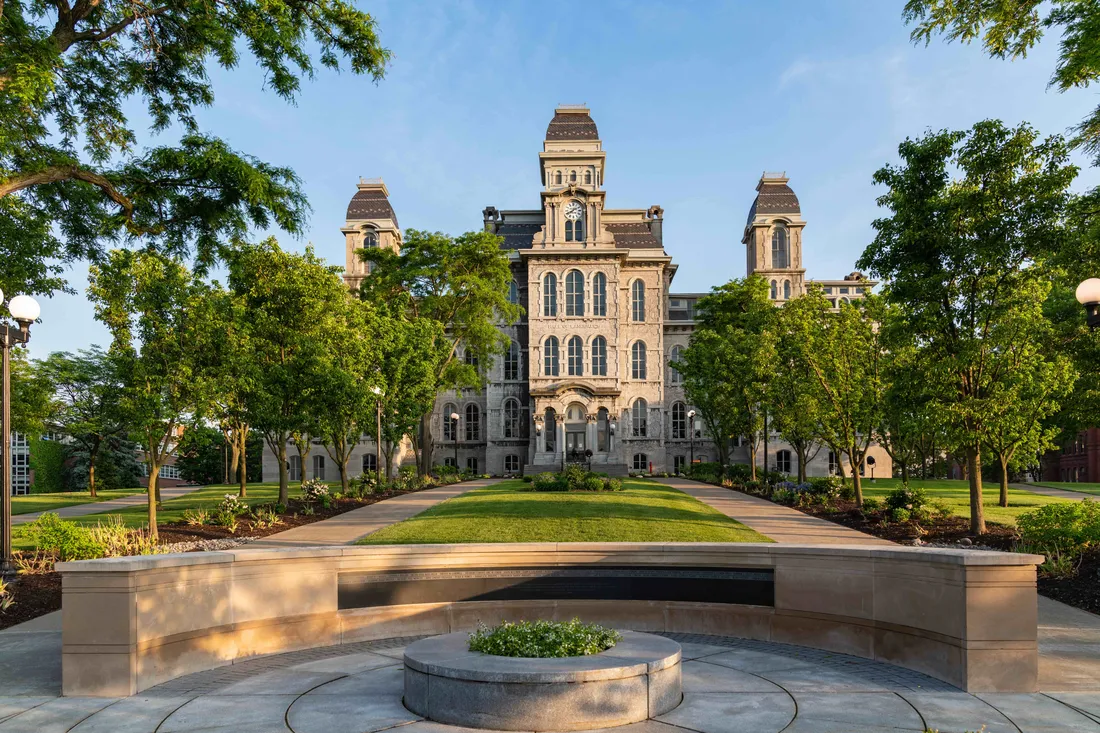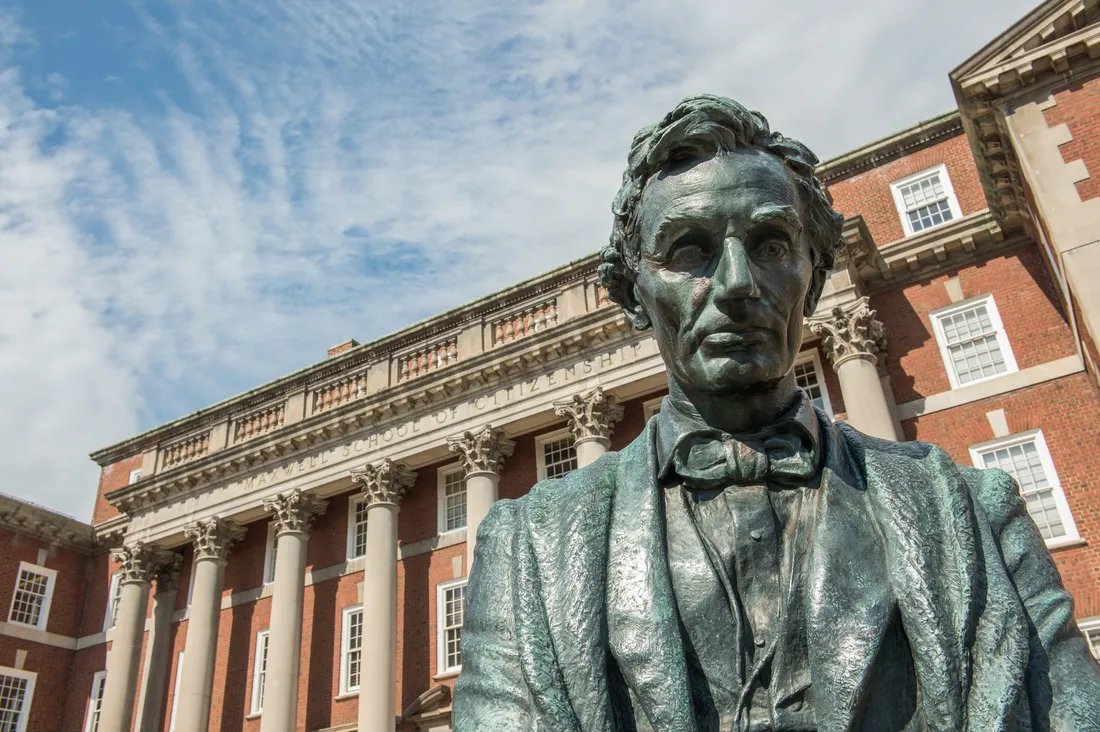When Gezzer Ortega ’03 chose Syracuse University from a long list of college acceptances, it was the beginning of a special relationship between him and the University. He would discover a path to a successful career as a physician-scientist, and his alma mater would be grateful for the altruism of an extraordinarily engaged alumnus.
As the lead faculty for research and innovation for equitable surgical care at the Center for Surgery and Public Health at Harvard Medical School’s Brigham and Women’s Hospital in Boston, Ortega is focused on addressing inequities that affect patients from socioeconomically disadvantaged populations, including low-income people of color and those with limited English proficiency. A graduate of Syracuse’s College of Arts and Sciences, he earned a bachelor’s degree in biochemistry with a minor in information management from the School of Information Studies. He went on to receive a medical degree from Howard University and a master of public health degree from Johns Hopkins University.
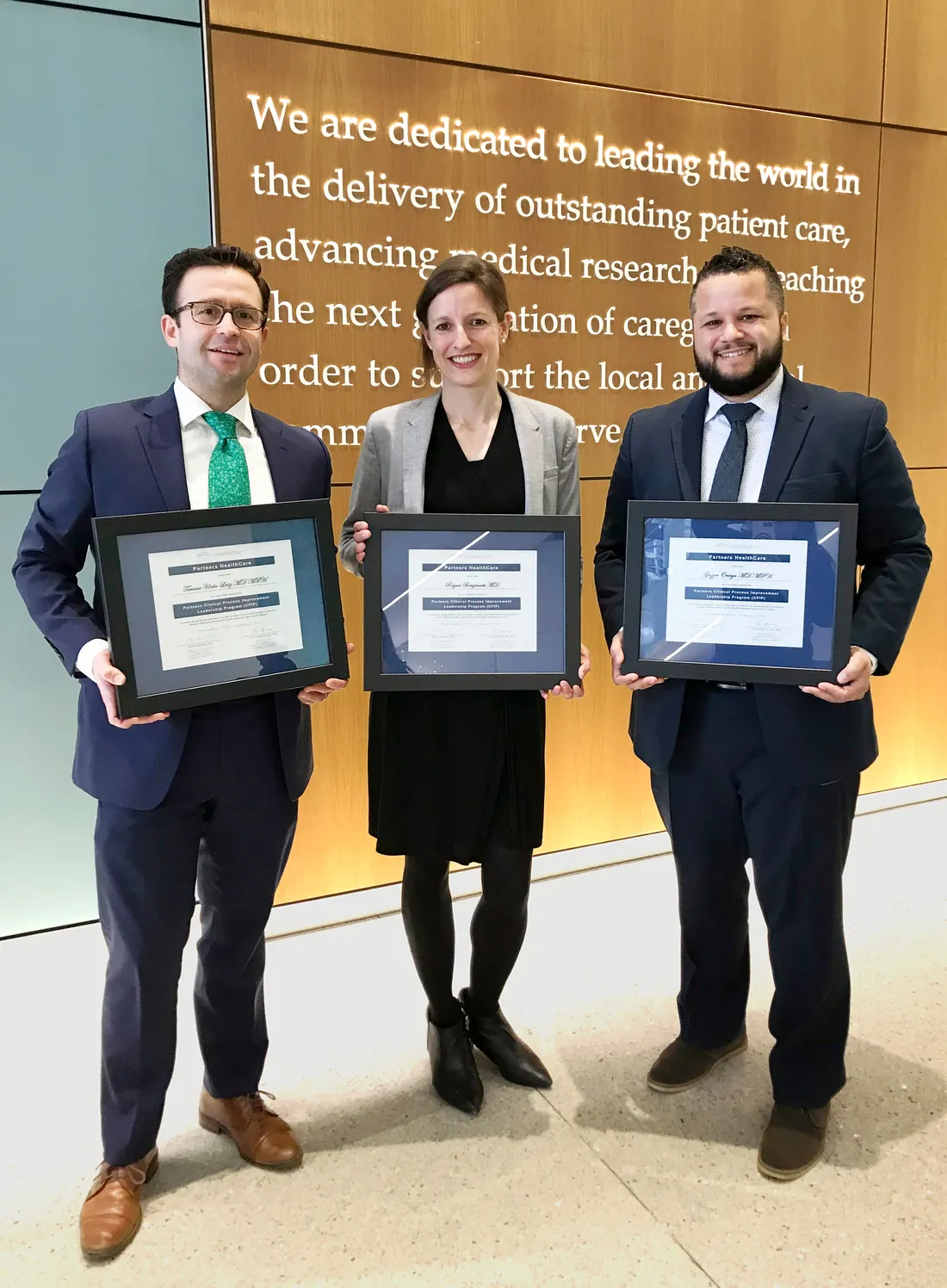
Dr. Gezzer Ortega '03 (right) and his physician-scientist colleagues Pablo Tarsicio Uribe Leitz and Regan Bergmark worked on a project together at Brigham and Women’s Hospital in Boston.
Last September, Ortega was awarded the Chancellor’s Citation for Excellence in Medicine during the triennial Coming Back Together Black and Latino alumni reunion. He delivered the keynote address at the 2021 Convocation for Arts and Sciences and the Maxwell School of Citizenship and Public Affairs. “Gezzer is a valued member of the Arts and Sciences Dean’s Advisory Board,” says Dean Karin Ruhlandt. “We are grateful for his leadership and willingness to give back. He is a wonderful resource and model of ethical action for all of our students, and especially for those interested in medicine-related fields.”
Ortega has also been a guest lecturer for health humanities courses, presented at the 2014 and 2020 Coming Back Together reunions, and was recognized with a Collegiate Science and Technology Entry Program Alumni Award in 2017.
An Education in Resilience
Ortega grew up in what he describes as a tough Brooklyn neighborhood where people faced the kinds of inequities he now confronts in his work every day. He was the eldest of four children whose parents had immigrated from the Dominican Republic and spoke only Spanish. “We were poor and had limited resources in our community,” he remembers, “but whatever opportunities were available we learned to share with each other.”
The Ortega children learned English in their bilingual public school and spoke it with their classmates. A neighbor who was fluent in English and Spanish read to them and helped the family complete forms and school assignments. “My parents were hardworking and resourceful but did not always understand how to navigate the educational system for their children,” he recalls. “Along the journey, there were mentors and supports that aided our development—after-school programs, Police Athletic League sports, Medicaid, food stamps, and the Supplemental Nutrition Program for Women, Infants and Children. I believe our parents instilled in us a strong work ethic, and our community made us resilient. We were able to attend good high schools, which cemented the foundation for the rest of our education.”
All four Ortega children went on to college—three at Syracuse University. His brother Oswald Ortega ’05 graduated from the School of Architecture and sister Rosslyn Ortega ’06 graduated from the Whitman School of Management. His youngest sister, Madellyn, attended Lehman College at the City University of New York. “Later in life, it was our turn to support our parents in their education,” Ortega says. “My father obtained certificates in various technical fields and my mother now has a master’s degree in counseling.”
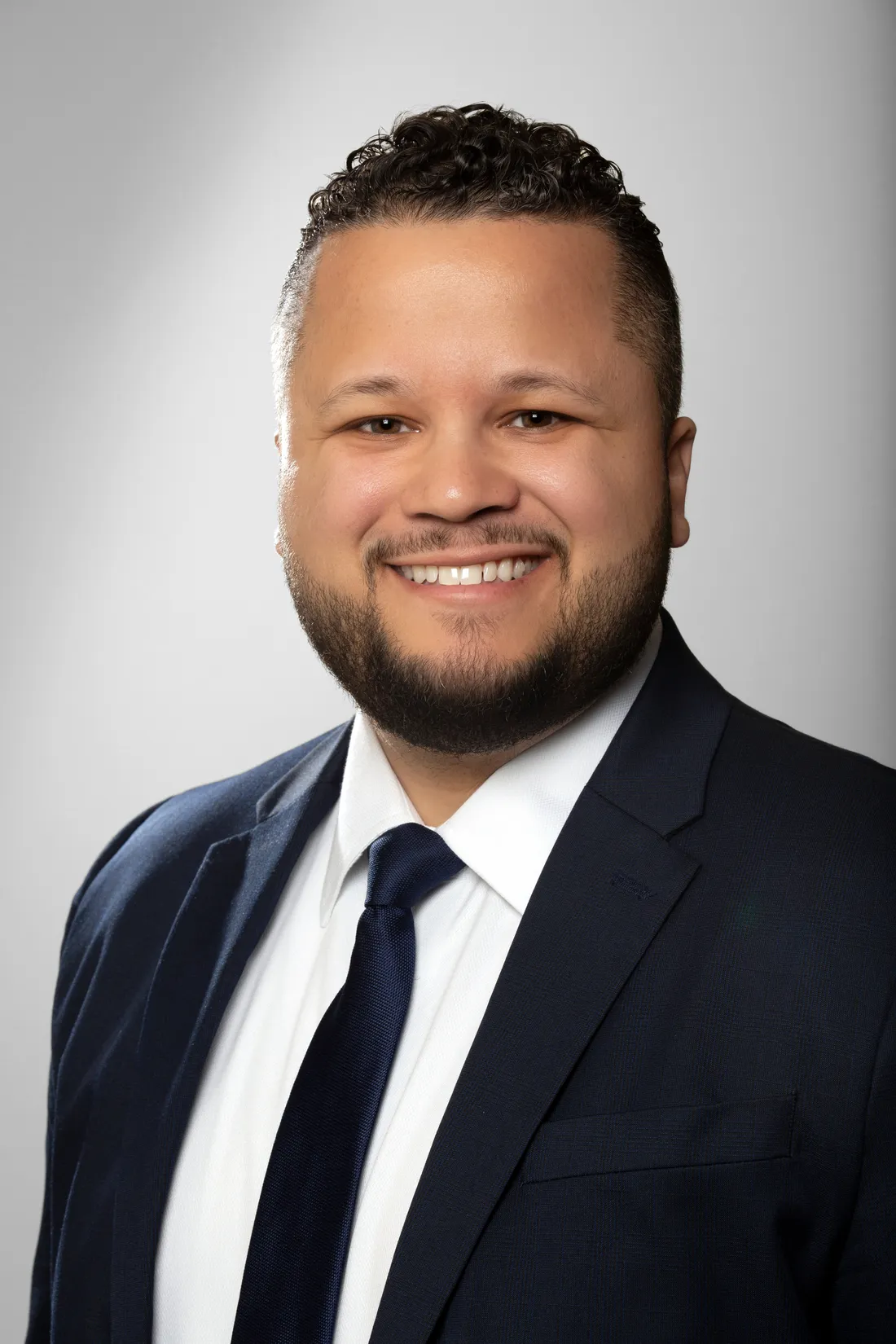
Dr. Gezzer Ortega ’03 is the lead faculty for research and innovation for equitable surgical care at Center for Surgery and Public Health, Brigham and Women’s Hospital, Harvard Medical School.
A New Approach to Patient Care
Ortega’s early experiences planted seeds for a pivot that would come after he had distinguished himself in his career. “As I worked with patients, I started to realize that many of the concerns that impact their care are systemic issues that are tough to address through direct patient care,” he says. “The barriers that most influence whether a person gets great or substandard medical care are racism, poverty and a lack of health insurance or being underinsured. A common argument against serving patients with low socioeconomic status or a language barrier is the cost factor—providers often become disincentivized to work with Medicaid patients because they are reimbursed at lower rates for the same level of services given to commercially insured patients.”
I now have an opportunity to provide evidence and leverage my leadership role to reform policies and change the current health care system.
Dr. Gezzer Ortega ’03
A desire to confront these underlying barriers led him toward a focus on research and indirect care while maintaining some of the direct patient care he enjoys. In his current position, Ortega is training a generation of physicians that is more diverse than ever before. He co-founded the Latino Surgical Society to cultivate and support the advancement of Latino surgeons and hopes that diversifying the pool of future health professionals will lead to more holistic treatment and better patient outcomes. “I now have an opportunity to provide evidence and leverage my leadership role to reform policies and change the current health care system,” he says. He hopes his life’s work will lead to meaningful reforms focused on equity, improved physician-patient communication and health care access for all.
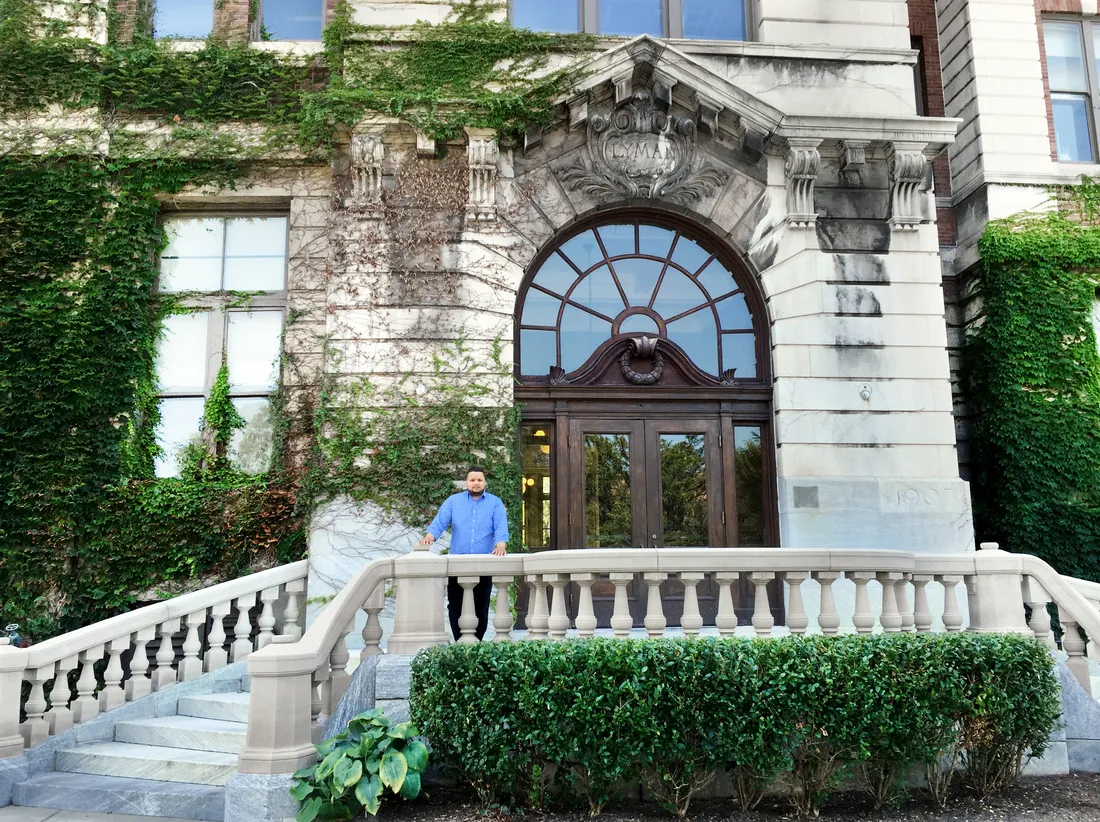
Dr. Gezzer Ortega '03 at Lyman Hall on the Syracuse University campus.
Looking Back
Ortega’s course of study at Syracuse University prepared him well for the career path he chose, but he points out that his learning went far beyond that. “Syracuse was also an education on how to use resources and opportunities that complemented my studies,” he says. He found himself on a campus where he was surrounded by support from faculty members, scholarship and financial aid counselors, and mentors in the Office of Multicultural Affairs. Programs and organizations like CSTEP, the National Society of Black Engineers and the Society for Hispanic Professional Engineers were also critical to his success.
Syracuse was also an education on how to use resources and opportunities that complimented my studies.
Dr. Gezzer Ortega ’03
“Perseverance is important, but students also need resources and support to help them achieve their goals,” he says. Ortega remembers spending countless hours of his freshman year in the Office of Financial Aid and Scholarship Programs searching for sources that would help him finance his education. “Patricia Johnson, the office’s associate director, told me about a new scholarship that seemed perfect for me,” he recalls. “It was the Gates Millennium Scholars Program. I applied and received a full scholarship for the remainder of my undergraduate education and part of my graduate education.”
Looking Back Ortega’s …
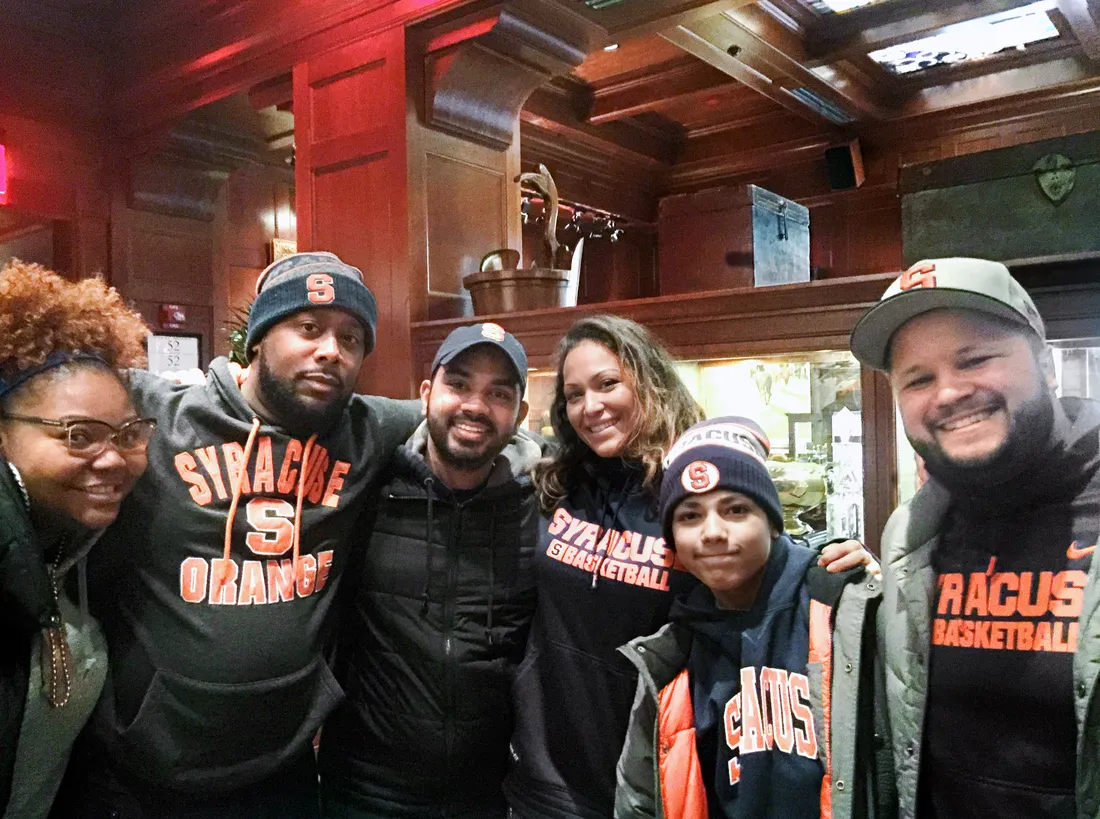
Dr. Gezzer Ortega '03 (right) gathered with family members and Syracuse University alumni in Washington, D.C., for a Syracuse-Georgetown basketball game.
Positive experiences like these made Ortega want to give back to the University that helped shape his future. In addition to his work on the Arts and Sciences Dean’s Advisory Board, Ortega mentors pre-med students and members of Alpha Phi Alpha, the fraternity where he was chapter president while at Syracuse, as well as undergraduate students who have joined him in Boston. He also supports Our Time Has Come scholarships, which were established in 1987 to assist underrepresented students and continue to provide a financial lifeline for more than 80 current undergraduates.
“Creating an environment and culture of inclusivity and belonging takes work from everyone,” he says. “People in leadership roles have to make it a priority and we have to be willing to embrace difficult conversations, demonstrate respect and curiosity, acknowledge privilege, serve as advocates or allies for each other, and work to be better.” As a Syracuse University alumnus, Ortega feels a responsibility to be part of that effort. “To ‘Be Orange’ is to be thoughtful, inquisitive, curious, tolerant, ambitious and a leader,” he says. “Orange is a bright color—it stands out. We are made to be bold and inspire.”

